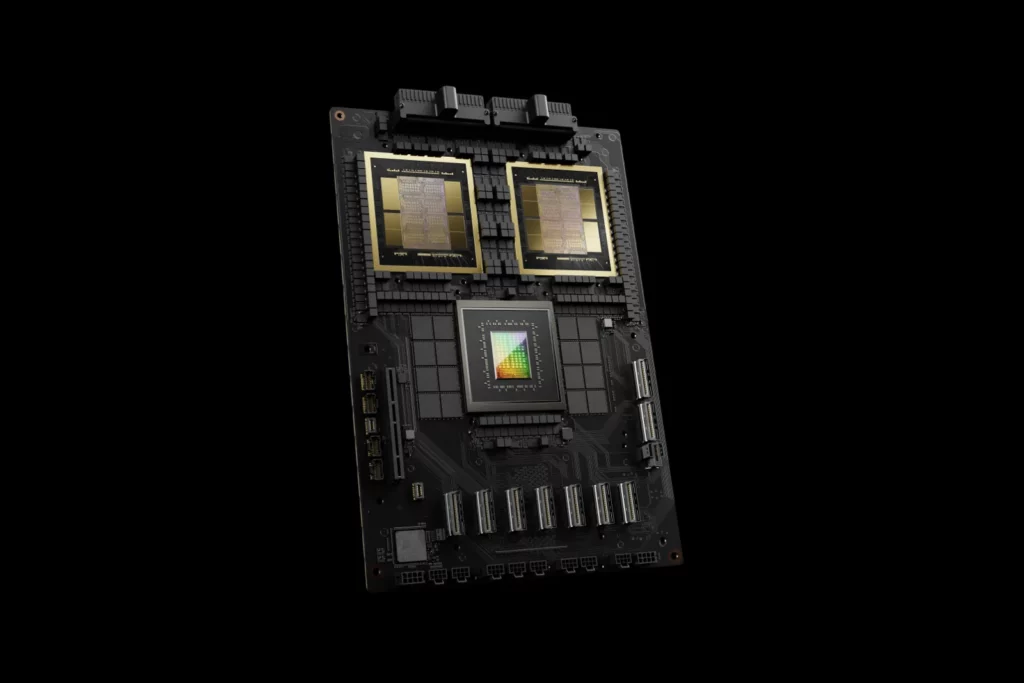Nvidia Blackwell Revealed: In a groundbreaking development poised to redefine the landscape of artificial intelligence (AI), Nvidia has unveiled its latest technological marvel, the Blackwell B200 graphics processing unit (GPU). This announcement signifies a significant leap forward for Nvidia, positioning the company as a trailblazer in AI innovation and reinforcing its standing as one of the world’s leading technology enterprises.

The highly anticipated revelation took center stage as Nvidia CEO Jensen Huang unveiled the Blackwell B200 GPU during a press conference in San Jose, California, on March 18th, captivating audiences worldwide.
Huang showcased the extraordinary capabilities of the Blackwell B200 GPU, featuring an unprecedented 208 billion transistors, a monumental advancement from Nvidia’s previous-generation Hopper chips with 80 billion transistors. Additionally, Huang introduced the GB200 Grace Blackwell Superchip, a cutting-edge amalgamation of two B200 chips, promising enhanced performance and efficiency beyond compare.
According to Huang, the Blackwell chips are poised to revolutionize AI training, particularly in the domain of generative AI, promising unparalleled advancements in computational capabilities. “Blackwell is set to redefine the landscape of generative AI,” Huang exclaimed, envisioning a future where data centers serve as the cornerstone of AI innovation.
Nvidia’s latest innovation arrives at a critical juncture, addressing the escalating demand for GPUs among organizations striving to train large AI models. The unveiling comes amidst widespread shortages of AI chips in 2023, with the scarcity of GPUs reaching unprecedented levels, prompting comparisons to essential commodities like pharmaceuticals. Academic researchers, in particular, grappled with the daunting task of securing access to GPUs, underscoring a growing chasm in GPU availability.
Nvidia asserts that its Blackwell chips deliver a staggering 30-fold improvement in performance compared to Hopper GPUs when executing generative AI tasks based on large language models such as OpenAI’s GPT-4, all while consuming 25 times less energy. For instance, whereas training GPT-4 previously demanded approximately 8000 Hopper GPUs and 15 megawatts of power over 90 days, the same feat can now be accomplished using just 2000 Blackwell GPUs consuming 4 megawatts of power.
Despite the groundbreaking advancements heralded by Nvidia’s Blackwell chips, concerns persist regarding their accessibility. With pricing details yet to be disclosed, industry analysts anticipate a substantial price tag that may restrict access to these superchips to only a select few elite organizations.
Sasha Luccioni, from Hugging Face, a company specializing in AI code and dataset sharing tools, warns that the exorbitant cost of Blackwell GPUs could exacerbate existing disparities within the AI community, likening it to a “let them eat cake” scenario.
Furthermore, the proliferation of data centers to accommodate the burgeoning demand for AI training raises significant environmental apprehensions. The exponential surge in electricity demand, primarily driven by the generative AI boom, is forecasted to double by 2026, equivalent to the energy consumption of Japan today. If data centers continue to rely on fossil fuel power plants, this expansion could precipitate a sharp rise in carbon emissions, exacerbating concerns about climate change.
Nvidia’s ascension in the realm of AI innovation has not been devoid of geopolitical intricacies, particularly amidst escalating tensions between the US and China.
The US government’s imposition of export controls on advanced chip technologies, ostensibly to curb China’s AI development endeavors, has compelled Nvidia to navigate complex diplomatic and strategic dilemmas. Consequently, the company has been prompted to develop less potent iterations of its chips for Chinese clientele, underscoring the intricate interplay between technology, geopolitics, and national security.
In unveiling its revolutionary Blackwell chips, Nvidia has not only raised the bar for AI performance but has also ignited a broader discourse on accessibility, environmental sustainability, and geopolitical dynamics shaping the future of AI innovation. As the AI landscape continues to evolve, the ramifications of Nvidia’s latest breakthroughs are poised to resonate across industries and nations, heralding a new epoch of AI-powered potential.
